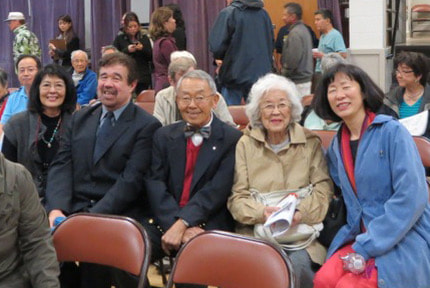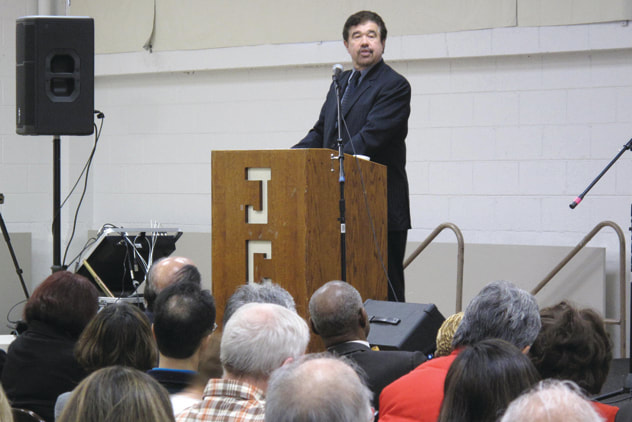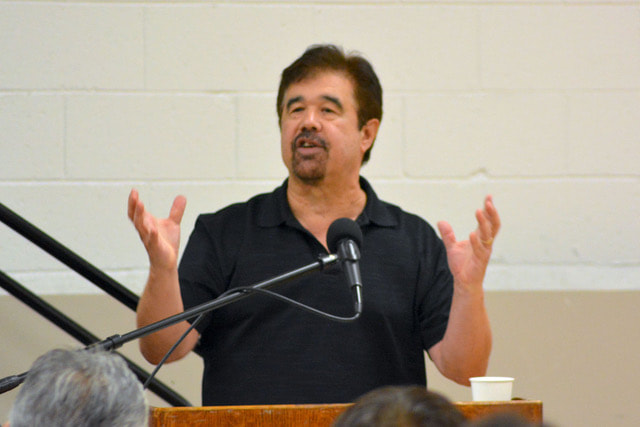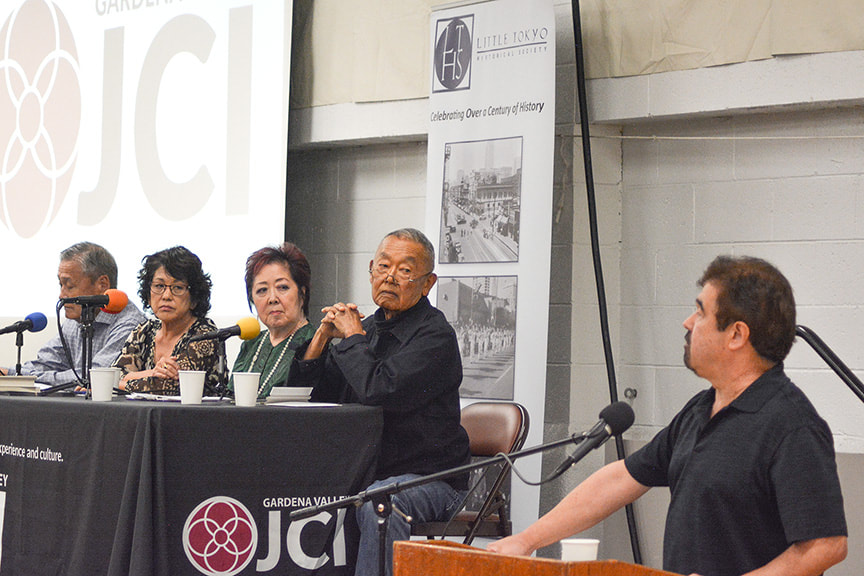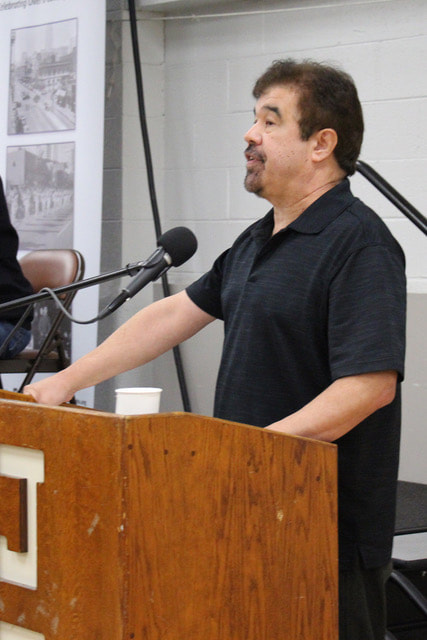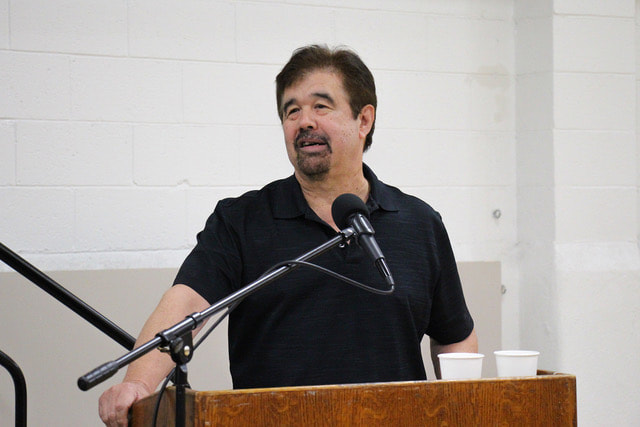Tribute to Lane Ryo Hirabayashi (1952-2020)
Lane Ryo Hirabayashi was the first George and Sakaye Aratani Endowed Chair on the Japanese American Incarceration, Redress, and Community at UCLA. He wrote and/or edited 9 books and over 30 academic publications, including numerous entries for the Densho Encyclopedia. Lane’s body of work is a valuable collection for anyone interested in the history of people of color in the U.S. and especially that of the Nikkei.
Beyond his career in academia, Lane had a strong connection to the Nikkei community. He spent a considerable amount of time in Gardena while researching the book, The Early Gardena Valley and the Issei, which he co-authored with George Tanaka, in collaboration with the Gardena Pioneer Project in 1986. Lane gathered information from his experiences in the community and from community members. He was always willing to share his knowledge, as he demonstrated when he delivered the keynote speech at the Gardena Valley Japanese Cultural Institute’s Day of Remembrance program in 2014. He also moderated a discussion panel at the GVJCI after a screening of Right of Passage, Janice Tanaka’s documentary about redress. This program was co-sponsored by the Little Tokyo Historical Society, another of the many community groups Lane was affiliated with. The GVJCI’s ability to call upon Lane to share what he had learned over his many years of research and scholarship has been a privilege for our organization.
On a more personal level, Lane was a kind, friendly person who supported numerous programs at the GVJCI. He enjoyed being with people, and we will miss seeing and talking with him. His influence and the knowledge that he imparted to so many of us, will hopefully lead to continuing efforts to educate others about the Nikkei experience.
Beyond his career in academia, Lane had a strong connection to the Nikkei community. He spent a considerable amount of time in Gardena while researching the book, The Early Gardena Valley and the Issei, which he co-authored with George Tanaka, in collaboration with the Gardena Pioneer Project in 1986. Lane gathered information from his experiences in the community and from community members. He was always willing to share his knowledge, as he demonstrated when he delivered the keynote speech at the Gardena Valley Japanese Cultural Institute’s Day of Remembrance program in 2014. He also moderated a discussion panel at the GVJCI after a screening of Right of Passage, Janice Tanaka’s documentary about redress. This program was co-sponsored by the Little Tokyo Historical Society, another of the many community groups Lane was affiliated with. The GVJCI’s ability to call upon Lane to share what he had learned over his many years of research and scholarship has been a privilege for our organization.
On a more personal level, Lane was a kind, friendly person who supported numerous programs at the GVJCI. He enjoyed being with people, and we will miss seeing and talking with him. His influence and the knowledge that he imparted to so many of us, will hopefully lead to continuing efforts to educate others about the Nikkei experience.
Community Tributes
|
Below is an excerpt from a tribute essay written by Professor Valerie Matsumoto from the UCLA’s Asian American Studies Center.
Remembering Lane Ryo Hirabayashi,
With deep appreciation Lane Hirabayashi was a valued friend and colleague—a prodigious scholar, teacher, and activist, whose work and ideals were deeply rooted in family tradition. He was greatly influenced by his father James A. Hirabayashi, a sociocultural anthropologist who was involved with the Third World Strike at San Francisco State University and became the first Dean of the School of Ethnic Studies. Working on projects with his father, as well as their discussions about "cultures of resistance," informed Lane's approach to social research that focused "on working with or for a community-based group seeking to empower an ethnic minority population that had been excluded from the mainstream in terms of resources and services..." |
Lane received his BA at the California State University, Sonoma (1974) and then pursued an MA (1976) and Ph.D. (1981) in Anthropology at UC Berkeley. Lane's engagement with the UCLA Asian American Studies Center (AASC) began in 1981, when he was awarded an Institute of American Cultures postdoctoral fellowship. Eager to get involved with the Japanese American community in Southern California, he began working with a range of community-based organizations, including the Gardena Pioneer Project, the National Coalition for Redress and Reparations (now Nikkei for Civil Rights and Redress), the Asian American Drug Abuse Program, and East West Players. In 1983, he left for a position in the School of Ethnic Studies at San Francisco State University. In the 1990s, he became a professor in Ethnic Studies at the University of Colorado at Boulder, and from 2003-2005, at UC Riverside.
|
Lane worked ceaselessly to bridge campus and community with numerous programs and events: He brought artists, activists, and scholars to campus, for example sponsoring a screening of Ann Kaneko and Sharon Yamato's 2013 documentary film, A Flicker in Eternity, based on a young Nisei's camp diary and letters from military service in Europe. Lane also organized many panels and programs to present scholarly research and publicize resources in Japanese American communities throughout the West. He worked closely with the Japanese American National Museum and the Gardena Valley Japanese Cultural Institute as well as community organizations in San Francisco, Denver, and Riverside. His calendar was packed with engagements, whether speaking at the screening of Toshi Washizu's film Issei in Walnut Grove, making a presentation about the UCLA AASC's Suyama Project in Sacramento, or participating in a Zócalo Public Square forum on "What Does the Japanese American Experience Tell Us About the Proposed Muslim Registry?" An inspiring orator who combined keen historical analysis with a passion for civil rights, he spoke at countless Days of Remembrance, organized by Japanese American communities to keep in memory the signing of Executive Order 9066, the presidential authorization of the forced removal of Japanese-descent people from the West Coast.
|
(left to right) Lane’s wife Marilyn Alquizola, Lane, Dr. Donald Hata - Emeritus Professor of History at CSU Dominguez Hills, Aiko Herzig Yoshinaga, Valerie Matsumoto - Professor in the Departments of History and Asian American Studies at UCLA.
|
Lane's research agenda remained full after his retirement from UCLA in 2017. Throughout his prolific academic career, he maintained a steadfast commitment both to scholarship and to what he called mutuality—not just conducting research but also acknowledging that there can be a deep sharing of purpose between researcher and subject. He learned this from his father, Jim, and it became a lifelong touchstone that always privileged active involvement with community. Lane wrote, "I have tried to both share what was given to me and to invite readers in turn to rethink and sharpen an approach that can be an integral tool in ethically and politically informed social research leading to engagement and empowerment..."
Please click any of the buttons below for more tributes to Lane from the community.
Lane's Work with GVJCI
|
GVJCI DAY OF REMEMBRANCE 2014: UNFINISHED BUSINESS
On March 1, 2014 Lane Hirabayashi, who at the time was the George and Sakaye Aratani Chair on Japanese American Incarceration, Redress, and Community and professor of Asian American Studies at UCLA, delivered the keynote address at the GVJCI Day of Remembrance program. The theme was “Unfinished Business.” The program pointed out, that despite the passage of the Civil Liberties Act of 1988, which provided redress and reparations for surviving Japanese Americans, it was not the conclusion of the movement. An important component of the legislation was to provide for continuing education of the public, about the hatred and prejudice which ultimately led to Executive Order 9066.
The need for this education was very real, in the wake of the 9/11 terrorist attacks, when Muslim Americans were threatened by similar acts of hatred. There were public calls for registering them and imprisoning them, in a manner similar to what Nikkei experienced many years before. There were executive orders and congressional legislation responding to demands for strengthened national security, in the forms of the Patriot Act; the creation of new federal agencies (Homeland Security, Transportation Security); the National Security Agency’s monitoring of private conversations; and the National Defense Authorization Act (NDAA). The NDAA included an ominous provision for “indefinite detention” of anyone, based on “suspicion” of sedition or treason. Lane addressed this. “The threat that history may one day repeat itself exists within sections of the 2012 National Defense Act, which grants the U.S. government the right to detain summarily anyone who is thought to be a risk to national security,” he said. “It is essential we educate all Americans about the tragic legacy of the incarceration of Japanese Americans so that we can remain vigilant against future human rights violations along these lines." |
|
THE SUYAMA PROJECT: POSTON STRIKE DISCUSSION & PROJECT ARCHIVES PRESENTATION
On November 22, 2014, details a major act of wartime resistance by Japanese Americans incarcerated at the Colorado River War Relocation camp, commonly known as Poston. The event was produced by the UCLA Asian American Studies Center and introduces a community setting the Suyama Project, a recently funded endeavor to preserve the history of wartime resistance. The live event featured Lane describing the development and conditions within the camp. He shows artwork created by Isao Sogioka, a camp incarcerate who depicted life in Poston and the strike of November 1942 in particular. Hirabayashi also interviews the 90 year-old striker Minoru "Min" Tajii about his memories of the strike. John Powers, who filmed the event, weaves interviews of prominent Japanese Americans who attended the live event. Among these are George Nakano, Don Hata, Aiko Herzig-Yoshinaga, and Yosh Kuromiya. |
|
RIGHT OF PASSAGE FILM SCREENING
On Sept. 23, 2017, Lane Hirabayashi served as emcee for the screening of the documentary, "Right of Passage” at the GVJCI. "Right of Passage" is a film by Janice Tanaka about the process of obtaining redress and reparations, culminating with the Civil Liberties Act of 1988. It included a panel discussion moderated by Lane, featuring Janice, Alan Nishio - community activist in the Little Tokyo People’s Rights Organization (LTPRO), the National Coalition for Redress/Reparations (NCRR), former Board President of the Little Tokyo Service Center, and the awardee of Manzanar Committee’s 2017 Sue Kunitomi Embrey Award, Miya Iwataki - community activist, former national legislative director for NCRR, former Host/Producer for Pacifica Radio station on KPFK-FM, Vice President of the Little Tokyo Historical Society and columnist for the Rafu Shimpo, Dr. Donald Hata - Emeritus Professor of History at CSU Dominguez Hills and author of “Japanese Americans and World War II: Mass Removal, Imprisonment, and Redress.”
Photo Gallery of Lane's Work
To learn more about Lane's work and publications, visit his website.
Special thanks to:
Richard Katsuda
Akemi Kikumura Yano
Japanese American Memorial Pilgrimages
Kimiko Marr
Nikkei for Civil Rights and Redress
Valerie Matsumoto
John Powers
Richard Katsuda
Akemi Kikumura Yano
Japanese American Memorial Pilgrimages
Kimiko Marr
Nikkei for Civil Rights and Redress
Valerie Matsumoto
John Powers



